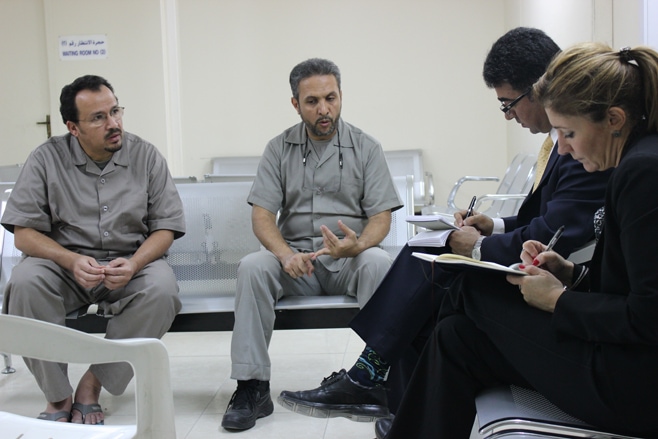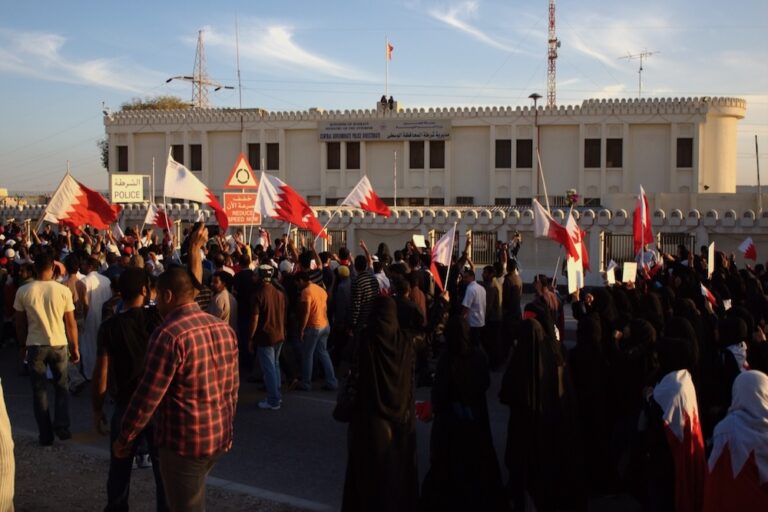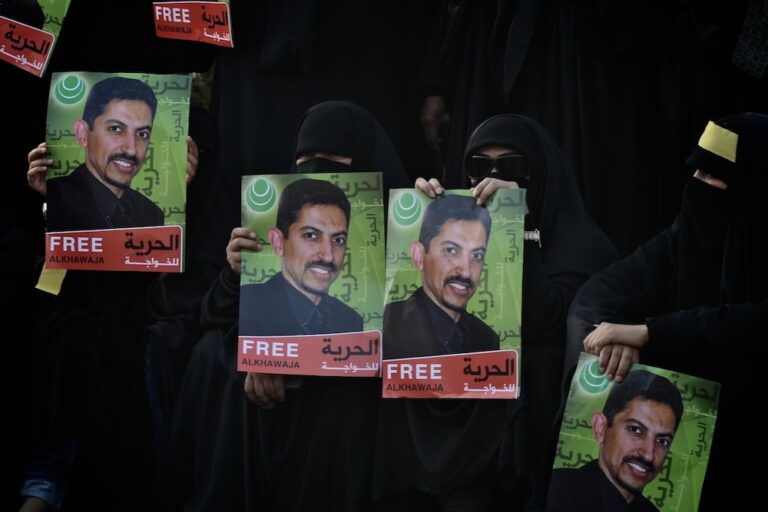During a 5-day visit to Bahrain, Human Rights Watch met with several imprisoned political and human rights activists as well as officials and ministers in order to evaluate the country's human rights record.
UPDATE: On 2 March, Bahrain’s Interior Ministry issued a statement claiming that Human Rights Watch had misrepresented what ministry officials said in meetings earlier in the week (Human Rights Watch, 7 March 2013)
(Human Rights Watch/IFEX) – Bahrain’s rulers have made no progress on key reform promises, failing to release unjustly imprisoned activists or to hold accountable high-level officials responsible for torture, Human Rights Watch said today at a news conference in Manama.
In addition, a draft association law adopted by the government significantly undermines what few rights independent nongovernmental associations have under the country’s current law, Human Rights Watch said. Human Rights Watch made the assessments after meeting with high-ranking officials and with political prisoners.
“All the talk of national dialogue and reform mean nothing so long as the country’s most prominent human rights and political activists remain unjustly imprisoned while officials responsible for torture and murder remain in their positions,” said Sarah Leah Whitson, Middle East director at Human Rights Watch. “The minimum one should expect after the gross abuses by security forces during the 2011 uprising is recognition at the highest level of the security and defense forces, including the Interior and Defense Ministers, that they bear the responsibility for the failures of their forces – failures they have acknowledged – and will account for them.”
During a five-day visit, the first allowed to Human Rights Watch by the government in almost a year, three representatives met with the interior minister, Lt. Gen. Shaikh Rashid bin Abdullah Al Khalifa; the attorney general, Dr. Ali Fadl al-Buainain;Nawaf Abdulla Hamza, head of the Special Investigations Unit (SIU) responsible for investigating police excesses and command responsibility; the chief of public security,Maj. Gen. Tariq Hassan;John Timoney, senior police adviser to the Interior Ministry, and representatives of the Social Development and Human Rights ministries.
Human Rights Watch’s visit was facilitated by the newly established Human Rights Ministry. Human Rights Watch met with the ministry’s legal affairs director, Mohamed al-Fazi, and urged the ministry to take an active role in addressing the government’s human rights shortcomings and advocating needed reforms.
Human Rights Watch said that Bahraini authorities had facilitated frank and candid meetings with government officials but that the government has unreasonably restricted its access to Bahrain, denying and ignoring numerous requests for visas over the past two years and refusing entry altogether for one representative.
In November 2011, the Bahrain Independent Commission of Inquiry (BICI), international experts appointed by King Hamad bin Isa Al Khalifa, concluded that Bahrain’s security forces operated within a “culture of impunity” and that the abuses “could not have happened without the knowledge of higher echelons of the command structure” of the security forces.
Human Rights Watch concluded, based on the discussions with officials, that authorities have made no progress in investigating and prosecuting higher-level officials responsible for the worst abuses during the 2011 protests. The abuses resulted in the death of scores of protesters and bystanders, serious injuries to hundreds of people, arrests of thousands more, and more than 300 formal allegations of torture and ill-treatment.
The attorney general and head of the Special Investigations Unit told Human Rights Watch that their investigations into those responsible for the failures of the security forces would conclude by the summer of 2013, but they would not provide information about any progress made in their investigations or about any officials whose roles were being investigated, or their ranks. Only four low-ranking officers and one first lieutenant have been convicted in the deaths of two protesters and serious injury to a third.
Hassan told Human Rights Watch that Interior Ministry officials recognized that they had made “serious mistakes” in their handling of the mass demonstrations that rocked the country in 2011. However, Shaikh Rashid, the interior minister, said that internal investigations had found wrongdoing or misconduct only by police officials up to the rank of battalion commander.
Beyond that rank, he said, internal investigations had assigned no blame for wrongdoing, and no commanders or other ranking officials had been reprimanded, reassigned, demoted, suspended, or terminated. He confirmed that the ministry had no policy of suspending from duty or reassigning police officers facing criminal charges, including excessive use of force, torture, or suspicious killing, although Human Rights Watch noted that authorities had reportedly taken into custody two policemen in connection with a shooting death on February 14, 2013.
“It is mind-boggling that the same officials who were in charge during the unprecedented shootings, beatings, killings, and torture of hundreds of Bahraini citizens have identified no wrongdoing by high-ranking officials,” Whitson said. “How can any Bahraini citizen believe promises of police overhaul when those responsible for grievous policing failures are still setting policies and able to undermine possible investigations into their roles?”
On February 26, Human Rights Watch visited several of the political and human rights activists, medics, and teachers serving sentences ranging from two years to life in Jaw Prison and met with them privately. The Interior Ministry and prison officials facilitated the meetings. Human Rights Watch was able to photograph and videotape their meetings with the detainees.
On January 7, the Court of Cassation upheld the convictions and lengthy prison terms of 13 prominent dissidents, including sentences of life in prison for seven defendants, solely for exercising their rights to free expression and peaceful assembly in the 2011 protests. Bahrain authorities should amend the laws that gave rise to the unjust sentences against these men, Human Rights Watch said. King Hamad should pardon and expunge the criminal convictions of all those whose sentences the Court of Cassation has upheld.
“There can be no real claim that justice is being done in Bahrain so long as these men remain unjustly imprisoned,” Whitson said. “King Hamad should act urgently to release these men if authorities want to restore any sense of justice among the vast majority of the population.”
Human Rights Watch also expressed grave concern about a draft law to regulate nongovernmental organizations that the Social Development Ministry submitted to the government and that is now under consideration by the Parliament. The draft law would effectively convert every association registered or seeking to register – as required – into a government-controlled entity with no capacity to operate as an independent body.
Neither Khalid al-Koheji, the assistant under-secretary for community affairs, who is responsible for nongovernmental groups, nor Sultan Hammadi, the ministry’s legal counselor for nongovernmental group affairs, were willing to discuss the draft law that they helped to prepare, claiming that it was the responsibility of the government, Human Rights Watch said.
The most disturbing aspect of the draft law is that it would allow Social Development Minister Fatima al-Balooshi to reject an application from any group if the minister determines that Bahrain “does not need its services,” or to reject an application without giving any reason at all.
The law would forbid citizens from being members of more than one group doing similar work, unless the ministry approves, and would prohibit union members from joining a group that works on activities “related to” their union. Al-Koheji also said it would allow the minister to reject a group if its work is “similar” to that of another group.
“While Bahrain’s hired PR firms run around London and Washington presenting slick ‘reform agenda’ power-points, Fatima al-Balooshi is pushing a new law designed to cripple anything resembling independent civil society,” Whitson said. “As if her authoritarian powers under the current NGO law are not bad enough, she’s now put forward a law that will give her unmitigated and arbitrary control over whether a group can even register as a legal organization.”
Human Rights Watch also expressed concern about the government’s use of penal code article 168, which authorizes a fine and up to two years in prison for anyone who willfully disseminates false news knowing that it might result in harm to national security or the public order or safety if the dissemination amounts to direct incitement to violence.
In his meeting with Human Rights Watch, al-Buainain cited this law to justify his decision to prosecute Sayed Yusuf al-Muhafadha, acting vice-president of the Bahrain Center for Human Rights (BCHR) for “disseminating false news” for posting on his Twitter account a photograph of an injured protester. The attorney general told Human Rights Watch that because the protester had been injured days earlier Muhafadha’s reposting was evidence of “his intent to incite a violent demonstration.”
“If Bahraini officials believe that an activist is inciting violence by tweeting a picture of an injured demonstrator, then it’s clear that all the human rights training sessions they’ve attended have been wasted,” Whitson said.
Human Rights Watch raised with officials concern about reports of ongoing excessive and unlawful use of teargas, to which Bahraini opposition activists have attributed at least 16 deaths. A video observed by Human Rights Watch showed security forces firing what appeared to be teargas canisters indiscriminately into what the video identified as a residential neighborhood in A’ali village on February 14. Bahraini human rights groups say that security forces have carried out massive teargas attacks into Shia neighborhoods and villages as punishment for anti-government demonstrations held there.
Two youths died in February from injuries resulting from apparent wrongful use of force. Hussein al-Jaziri, 16, died of injuries from shotgun pellets fired at close range in al-Dia on February 14, the case in which the Interior Ministry says it has taken two policemen into custody. In a separate incident that same day, a video taken shows Mahmood al-Jaziri, 22, fall to the ground in al-Nabi Salej after he was hit in the head by a teargas canister fired from about 10 meters away. He died of his injuries on February 22.
“The ministry can put stickers in police cars on the correct use of teargas, but only investigations and disciplinary measures can address what appears to be frequent misuse of teargas by officers,” Whitson said.
Human Rights Watch also met with the newly appointed police ombudsman, Nawaf al-Maawdah, and head of his investigations unit, Abd al-Rahman Faris. Al-Maawdahsaid that a decree to be issued shortly will expand the ombudsman’s authority to visit and monitor detention centers and to investigate police misconduct even in the absence of an individual complaint.
These developments can enhance the role of the ombudsman as an independent monitor of police abuse, Human Rights Watch said. Human Rights Watch urged the ombudsman to address as an urgent priority the serious lack of diversity among police forces and prison guards, almost all of whom are Sunni while the majority of the prison population and citizenry are Shia, and to investigate discrimination in hiring, including at the ranks of senior officers.
“Effective community and prison policing requires a diverse police force that the Bahraini people can believe represents them,” Whitson said.



